Responsible Leadership Contribution to HRM in Poland
VerifiedAdded on 2023/01/17
|6
|1145
|23
Report
AI Summary
This report examines the contribution of responsible leadership to Human Resource Management (HRM), focusing on the context of Poland. It begins by defining responsible leadership and its importance in the current business environment, highlighting the need for leadership qualities in HR managers to navigate the dynamic global landscape. The report reviews relevant literature, emphasizing the connection between responsible leadership, ethical principles, and Corporate Social Responsibility (CSR). It discusses the research methodology, which involved a survey of Polish companies, and aligns the findings with the introduction and conclusion. The report reveals that while many employees in Poland are aware of CSR, they are less familiar with the link between leadership and HRM. It also discusses the need for improvements in Polish companies' HRM practices. The conclusion underscores the crucial role of responsible leadership in HRM and emphasizes the need for broader perspectives among managers to foster effective HRM practices and overall organizational development. The report references key academic articles supporting its arguments.
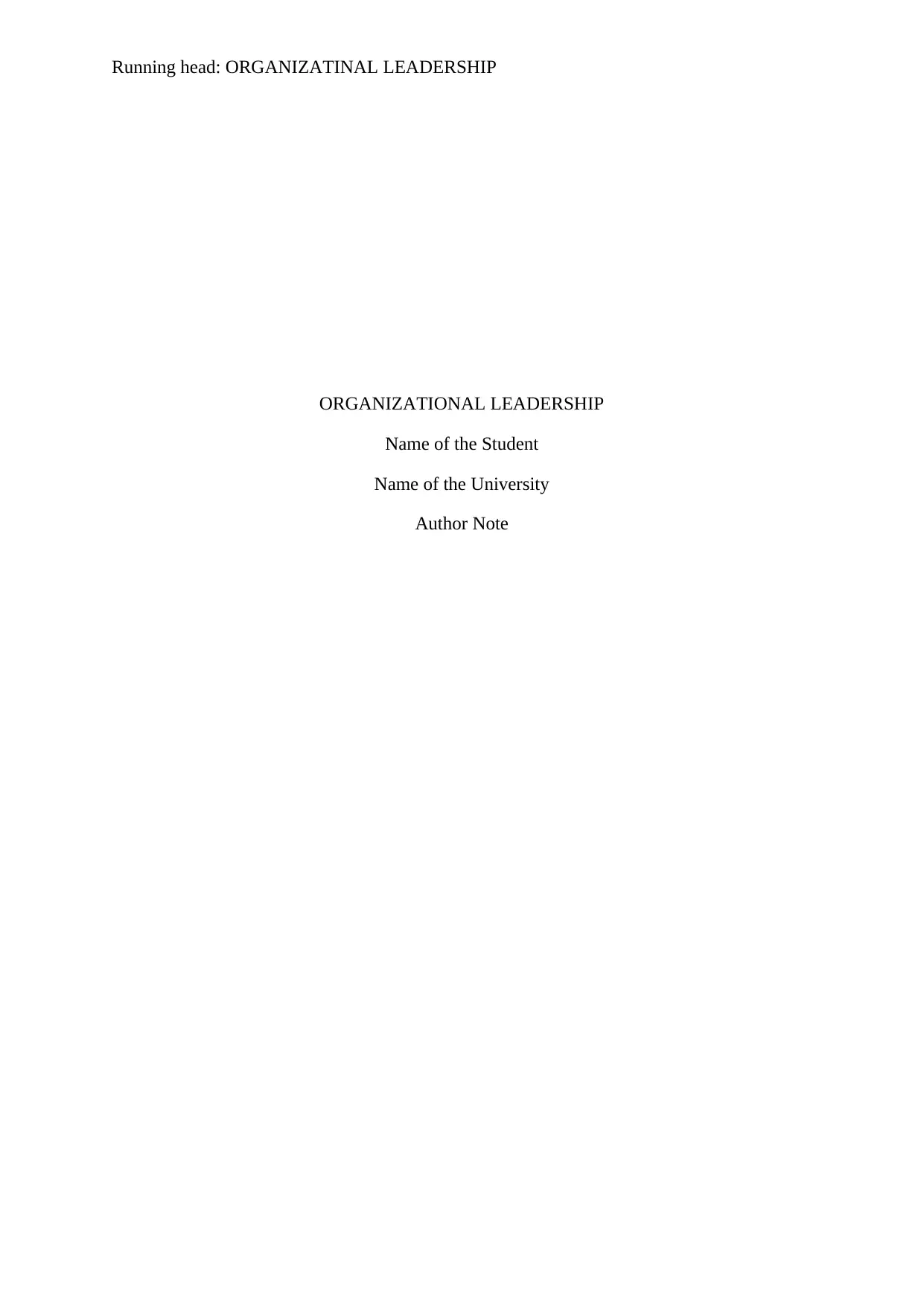
Running head: ORGANIZATINAL LEADERSHIP
ORGANIZATIONAL LEADERSHIP
Name of the Student
Name of the University
Author Note
ORGANIZATIONAL LEADERSHIP
Name of the Student
Name of the University
Author Note
Paraphrase This Document
Need a fresh take? Get an instant paraphrase of this document with our AI Paraphraser
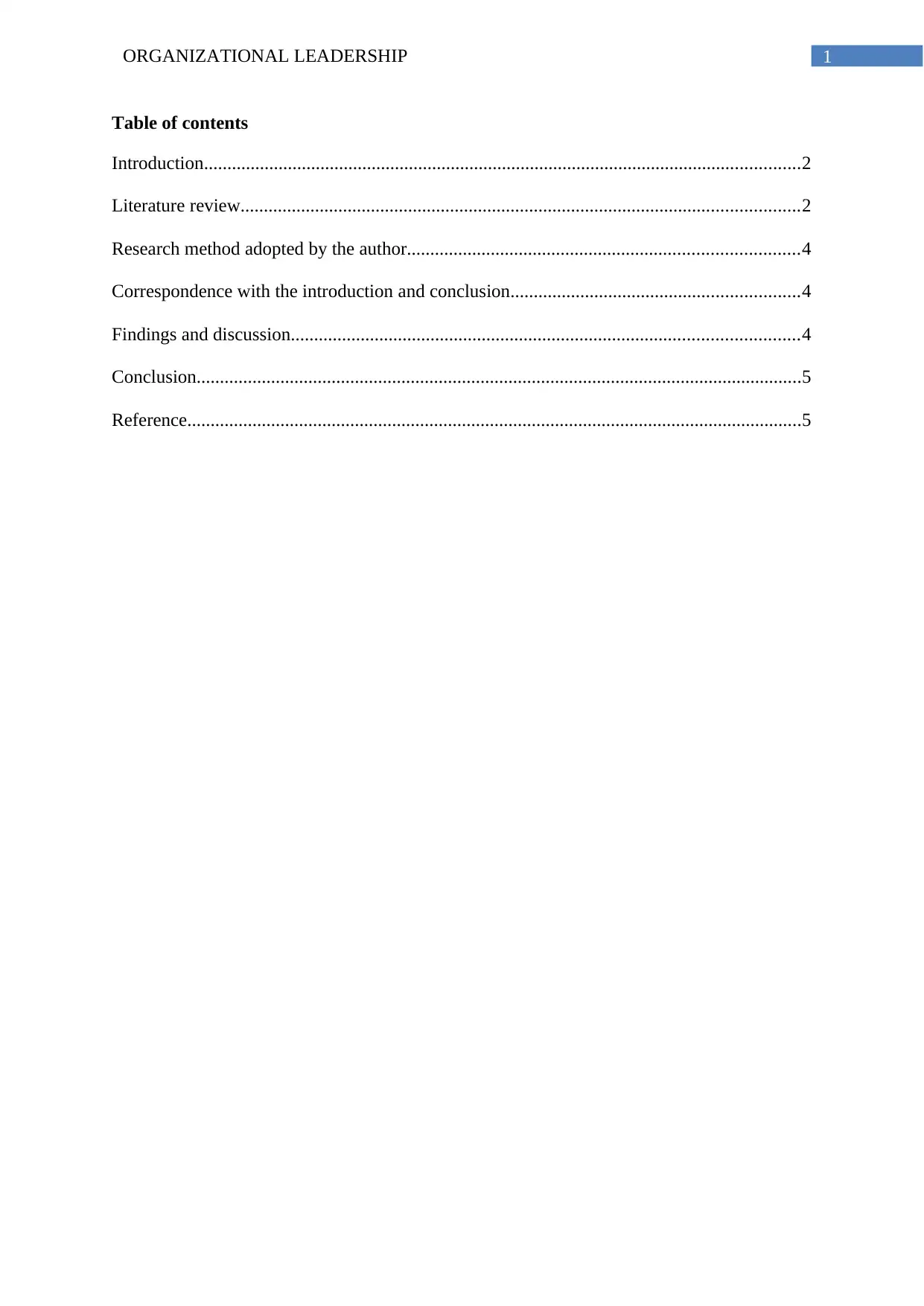
1ORGANIZATIONAL LEADERSHIP
Table of contents
Introduction................................................................................................................................2
Literature review........................................................................................................................2
Research method adopted by the author....................................................................................4
Correspondence with the introduction and conclusion..............................................................4
Findings and discussion.............................................................................................................4
Conclusion..................................................................................................................................5
Reference....................................................................................................................................5
Table of contents
Introduction................................................................................................................................2
Literature review........................................................................................................................2
Research method adopted by the author....................................................................................4
Correspondence with the introduction and conclusion..............................................................4
Findings and discussion.............................................................................................................4
Conclusion..................................................................................................................................5
Reference....................................................................................................................................5
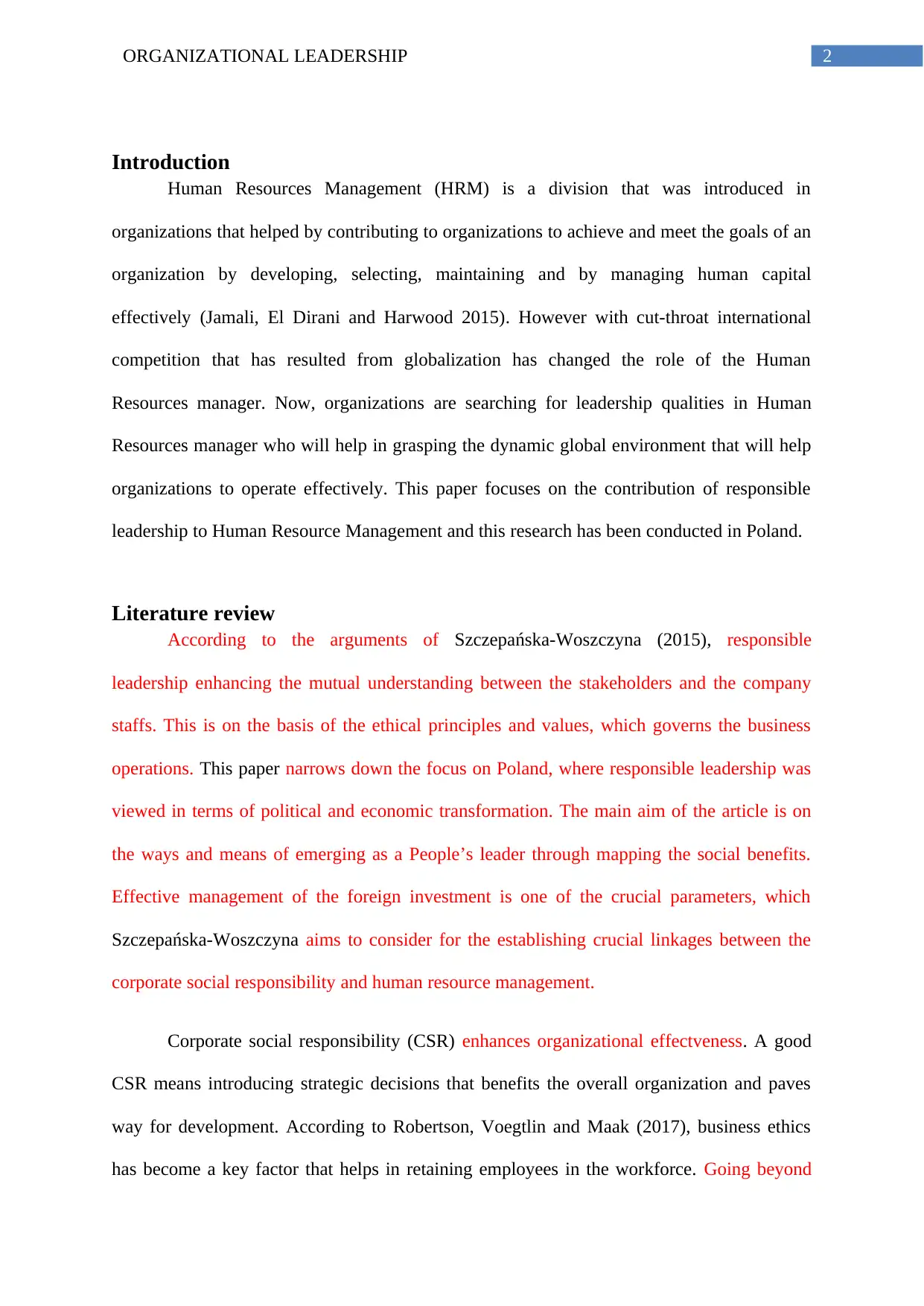
2ORGANIZATIONAL LEADERSHIP
Introduction
Human Resources Management (HRM) is a division that was introduced in
organizations that helped by contributing to organizations to achieve and meet the goals of an
organization by developing, selecting, maintaining and by managing human capital
effectively (Jamali, El Dirani and Harwood 2015). However with cut-throat international
competition that has resulted from globalization has changed the role of the Human
Resources manager. Now, organizations are searching for leadership qualities in Human
Resources manager who will help in grasping the dynamic global environment that will help
organizations to operate effectively. This paper focuses on the contribution of responsible
leadership to Human Resource Management and this research has been conducted in Poland.
Literature review
According to the arguments of Szczepańska-Woszczyna (2015), responsible
leadership enhancing the mutual understanding between the stakeholders and the company
staffs. This is on the basis of the ethical principles and values, which governs the business
operations. This paper narrows down the focus on Poland, where responsible leadership was
viewed in terms of political and economic transformation. The main aim of the article is on
the ways and means of emerging as a People’s leader through mapping the social benefits.
Effective management of the foreign investment is one of the crucial parameters, which
Szczepańska-Woszczyna aims to consider for the establishing crucial linkages between the
corporate social responsibility and human resource management.
Corporate social responsibility (CSR) enhances organizational effectveness. A good
CSR means introducing strategic decisions that benefits the overall organization and paves
way for development. According to Robertson, Voegtlin and Maak (2017), business ethics
has become a key factor that helps in retaining employees in the workforce. Going beyond
Introduction
Human Resources Management (HRM) is a division that was introduced in
organizations that helped by contributing to organizations to achieve and meet the goals of an
organization by developing, selecting, maintaining and by managing human capital
effectively (Jamali, El Dirani and Harwood 2015). However with cut-throat international
competition that has resulted from globalization has changed the role of the Human
Resources manager. Now, organizations are searching for leadership qualities in Human
Resources manager who will help in grasping the dynamic global environment that will help
organizations to operate effectively. This paper focuses on the contribution of responsible
leadership to Human Resource Management and this research has been conducted in Poland.
Literature review
According to the arguments of Szczepańska-Woszczyna (2015), responsible
leadership enhancing the mutual understanding between the stakeholders and the company
staffs. This is on the basis of the ethical principles and values, which governs the business
operations. This paper narrows down the focus on Poland, where responsible leadership was
viewed in terms of political and economic transformation. The main aim of the article is on
the ways and means of emerging as a People’s leader through mapping the social benefits.
Effective management of the foreign investment is one of the crucial parameters, which
Szczepańska-Woszczyna aims to consider for the establishing crucial linkages between the
corporate social responsibility and human resource management.
Corporate social responsibility (CSR) enhances organizational effectveness. A good
CSR means introducing strategic decisions that benefits the overall organization and paves
way for development. According to Robertson, Voegtlin and Maak (2017), business ethics
has become a key factor that helps in retaining employees in the workforce. Going beyond
⊘ This is a preview!⊘
Do you want full access?
Subscribe today to unlock all pages.

Trusted by 1+ million students worldwide
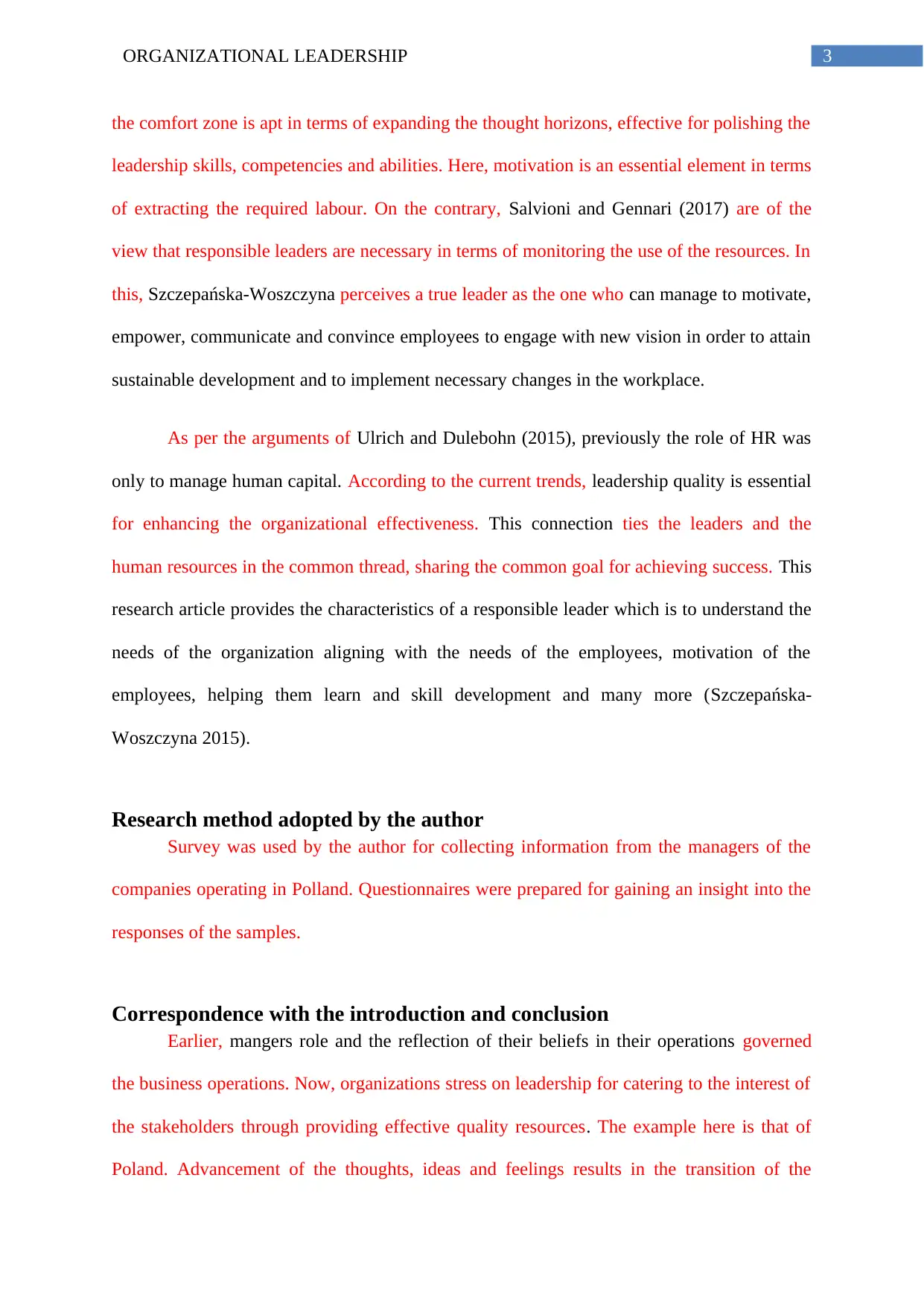
3ORGANIZATIONAL LEADERSHIP
the comfort zone is apt in terms of expanding the thought horizons, effective for polishing the
leadership skills, competencies and abilities. Here, motivation is an essential element in terms
of extracting the required labour. On the contrary, Salvioni and Gennari (2017) are of the
view that responsible leaders are necessary in terms of monitoring the use of the resources. In
this, Szczepańska-Woszczyna perceives a true leader as the one who can manage to motivate,
empower, communicate and convince employees to engage with new vision in order to attain
sustainable development and to implement necessary changes in the workplace.
As per the arguments of Ulrich and Dulebohn (2015), previously the role of HR was
only to manage human capital. According to the current trends, leadership quality is essential
for enhancing the organizational effectiveness. This connection ties the leaders and the
human resources in the common thread, sharing the common goal for achieving success. This
research article provides the characteristics of a responsible leader which is to understand the
needs of the organization aligning with the needs of the employees, motivation of the
employees, helping them learn and skill development and many more (Szczepańska-
Woszczyna 2015).
Research method adopted by the author
Survey was used by the author for collecting information from the managers of the
companies operating in Polland. Questionnaires were prepared for gaining an insight into the
responses of the samples.
Correspondence with the introduction and conclusion
Earlier, mangers role and the reflection of their beliefs in their operations governed
the business operations. Now, organizations stress on leadership for catering to the interest of
the stakeholders through providing effective quality resources. The example here is that of
Poland. Advancement of the thoughts, ideas and feelings results in the transition of the
the comfort zone is apt in terms of expanding the thought horizons, effective for polishing the
leadership skills, competencies and abilities. Here, motivation is an essential element in terms
of extracting the required labour. On the contrary, Salvioni and Gennari (2017) are of the
view that responsible leaders are necessary in terms of monitoring the use of the resources. In
this, Szczepańska-Woszczyna perceives a true leader as the one who can manage to motivate,
empower, communicate and convince employees to engage with new vision in order to attain
sustainable development and to implement necessary changes in the workplace.
As per the arguments of Ulrich and Dulebohn (2015), previously the role of HR was
only to manage human capital. According to the current trends, leadership quality is essential
for enhancing the organizational effectiveness. This connection ties the leaders and the
human resources in the common thread, sharing the common goal for achieving success. This
research article provides the characteristics of a responsible leader which is to understand the
needs of the organization aligning with the needs of the employees, motivation of the
employees, helping them learn and skill development and many more (Szczepańska-
Woszczyna 2015).
Research method adopted by the author
Survey was used by the author for collecting information from the managers of the
companies operating in Polland. Questionnaires were prepared for gaining an insight into the
responses of the samples.
Correspondence with the introduction and conclusion
Earlier, mangers role and the reflection of their beliefs in their operations governed
the business operations. Now, organizations stress on leadership for catering to the interest of
the stakeholders through providing effective quality resources. The example here is that of
Poland. Advancement of the thoughts, ideas and feelings results in the transition of the
Paraphrase This Document
Need a fresh take? Get an instant paraphrase of this document with our AI Paraphraser
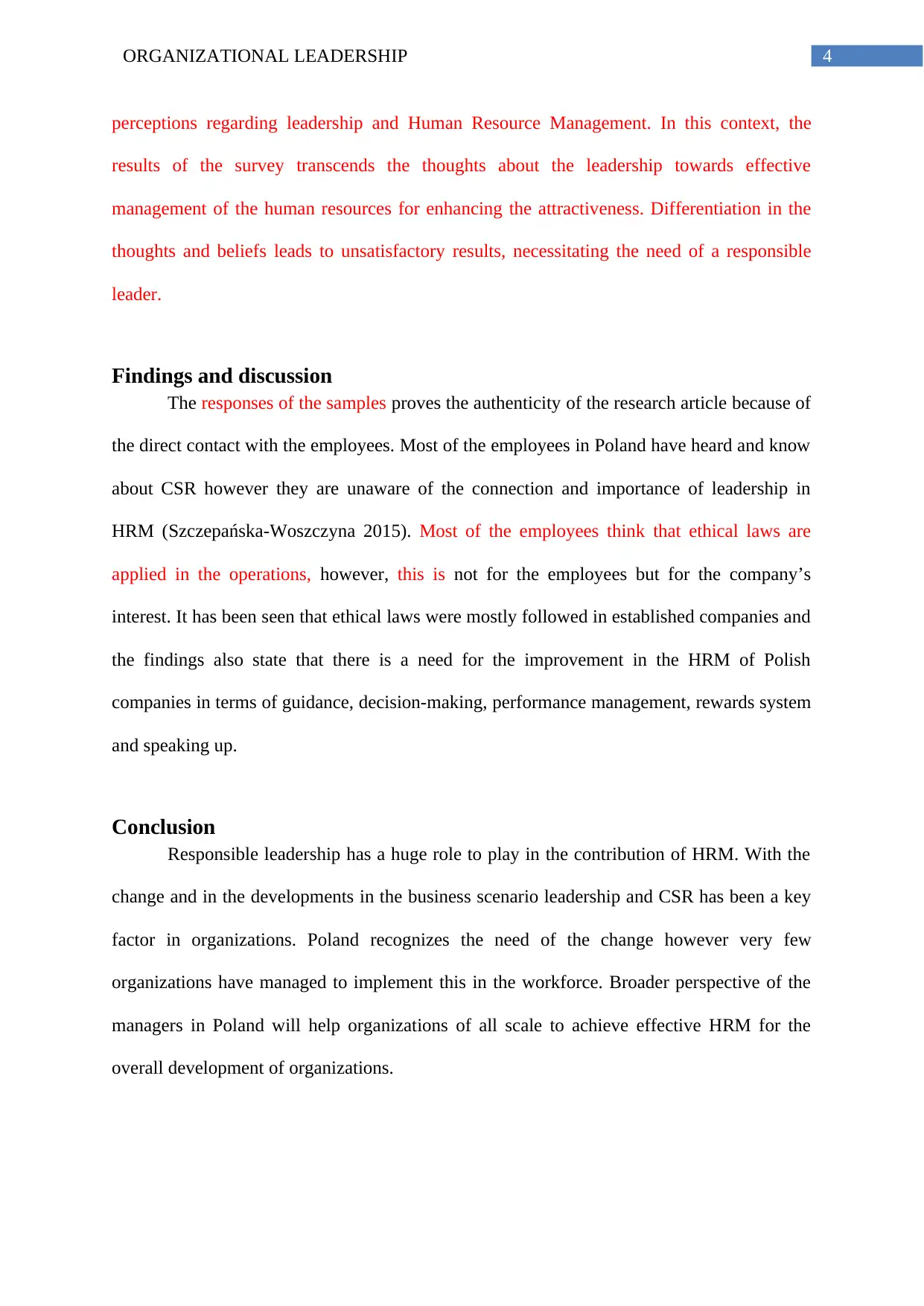
4ORGANIZATIONAL LEADERSHIP
perceptions regarding leadership and Human Resource Management. In this context, the
results of the survey transcends the thoughts about the leadership towards effective
management of the human resources for enhancing the attractiveness. Differentiation in the
thoughts and beliefs leads to unsatisfactory results, necessitating the need of a responsible
leader.
Findings and discussion
The responses of the samples proves the authenticity of the research article because of
the direct contact with the employees. Most of the employees in Poland have heard and know
about CSR however they are unaware of the connection and importance of leadership in
HRM (Szczepańska-Woszczyna 2015). Most of the employees think that ethical laws are
applied in the operations, however, this is not for the employees but for the company’s
interest. It has been seen that ethical laws were mostly followed in established companies and
the findings also state that there is a need for the improvement in the HRM of Polish
companies in terms of guidance, decision-making, performance management, rewards system
and speaking up.
Conclusion
Responsible leadership has a huge role to play in the contribution of HRM. With the
change and in the developments in the business scenario leadership and CSR has been a key
factor in organizations. Poland recognizes the need of the change however very few
organizations have managed to implement this in the workforce. Broader perspective of the
managers in Poland will help organizations of all scale to achieve effective HRM for the
overall development of organizations.
perceptions regarding leadership and Human Resource Management. In this context, the
results of the survey transcends the thoughts about the leadership towards effective
management of the human resources for enhancing the attractiveness. Differentiation in the
thoughts and beliefs leads to unsatisfactory results, necessitating the need of a responsible
leader.
Findings and discussion
The responses of the samples proves the authenticity of the research article because of
the direct contact with the employees. Most of the employees in Poland have heard and know
about CSR however they are unaware of the connection and importance of leadership in
HRM (Szczepańska-Woszczyna 2015). Most of the employees think that ethical laws are
applied in the operations, however, this is not for the employees but for the company’s
interest. It has been seen that ethical laws were mostly followed in established companies and
the findings also state that there is a need for the improvement in the HRM of Polish
companies in terms of guidance, decision-making, performance management, rewards system
and speaking up.
Conclusion
Responsible leadership has a huge role to play in the contribution of HRM. With the
change and in the developments in the business scenario leadership and CSR has been a key
factor in organizations. Poland recognizes the need of the change however very few
organizations have managed to implement this in the workforce. Broader perspective of the
managers in Poland will help organizations of all scale to achieve effective HRM for the
overall development of organizations.
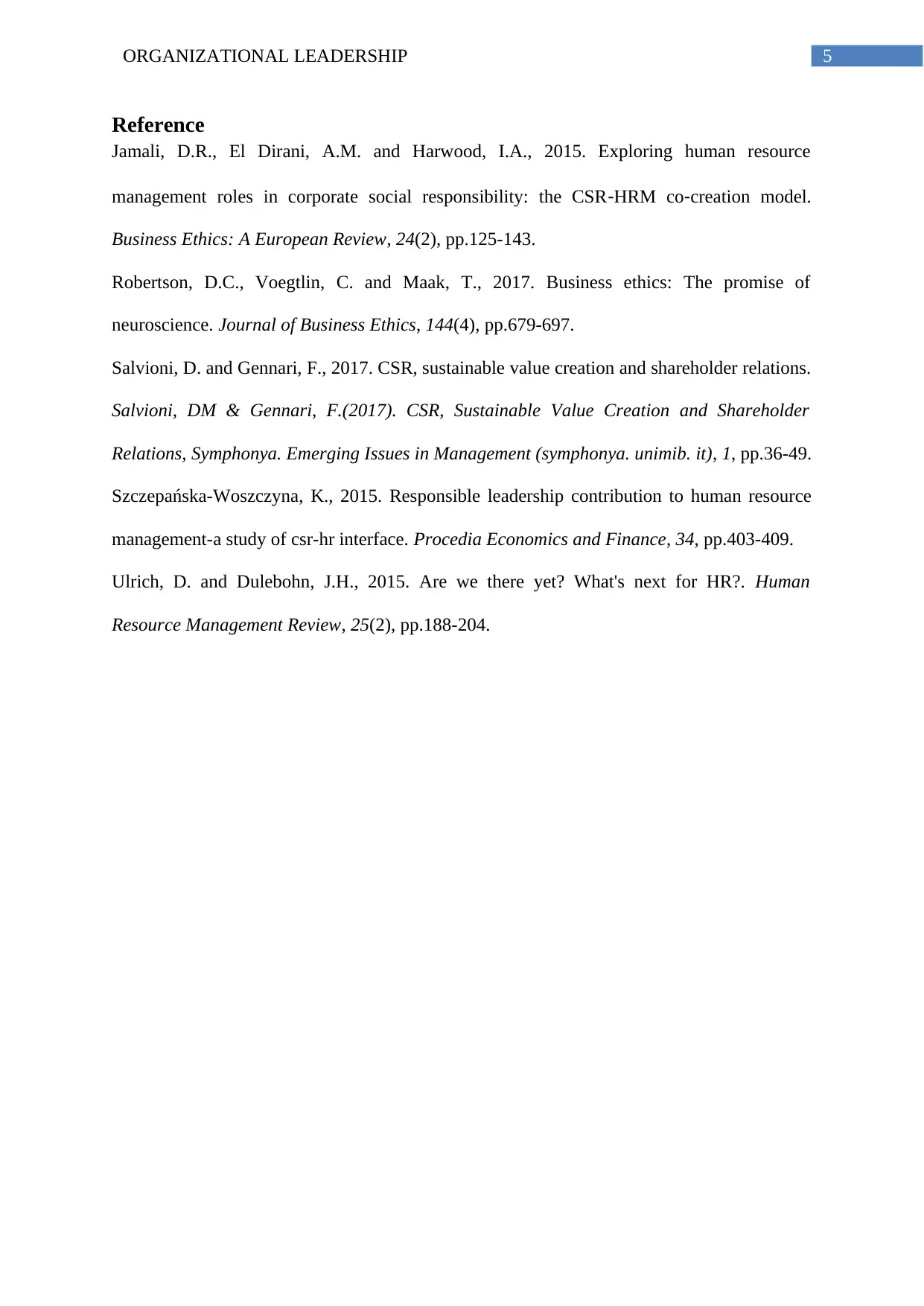
5ORGANIZATIONAL LEADERSHIP
Reference
Jamali, D.R., El Dirani, A.M. and Harwood, I.A., 2015. Exploring human resource
management roles in corporate social responsibility: the CSR‐HRM co‐creation model.
Business Ethics: A European Review, 24(2), pp.125-143.
Robertson, D.C., Voegtlin, C. and Maak, T., 2017. Business ethics: The promise of
neuroscience. Journal of Business Ethics, 144(4), pp.679-697.
Salvioni, D. and Gennari, F., 2017. CSR, sustainable value creation and shareholder relations.
Salvioni, DM & Gennari, F.(2017). CSR, Sustainable Value Creation and Shareholder
Relations, Symphonya. Emerging Issues in Management (symphonya. unimib. it), 1, pp.36-49.
Szczepańska-Woszczyna, K., 2015. Responsible leadership contribution to human resource
management-a study of csr-hr interface. Procedia Economics and Finance, 34, pp.403-409.
Ulrich, D. and Dulebohn, J.H., 2015. Are we there yet? What's next for HR?. Human
Resource Management Review, 25(2), pp.188-204.
Reference
Jamali, D.R., El Dirani, A.M. and Harwood, I.A., 2015. Exploring human resource
management roles in corporate social responsibility: the CSR‐HRM co‐creation model.
Business Ethics: A European Review, 24(2), pp.125-143.
Robertson, D.C., Voegtlin, C. and Maak, T., 2017. Business ethics: The promise of
neuroscience. Journal of Business Ethics, 144(4), pp.679-697.
Salvioni, D. and Gennari, F., 2017. CSR, sustainable value creation and shareholder relations.
Salvioni, DM & Gennari, F.(2017). CSR, Sustainable Value Creation and Shareholder
Relations, Symphonya. Emerging Issues in Management (symphonya. unimib. it), 1, pp.36-49.
Szczepańska-Woszczyna, K., 2015. Responsible leadership contribution to human resource
management-a study of csr-hr interface. Procedia Economics and Finance, 34, pp.403-409.
Ulrich, D. and Dulebohn, J.H., 2015. Are we there yet? What's next for HR?. Human
Resource Management Review, 25(2), pp.188-204.
⊘ This is a preview!⊘
Do you want full access?
Subscribe today to unlock all pages.

Trusted by 1+ million students worldwide
1 out of 6
Related Documents
Your All-in-One AI-Powered Toolkit for Academic Success.
+13062052269
info@desklib.com
Available 24*7 on WhatsApp / Email
![[object Object]](/_next/static/media/star-bottom.7253800d.svg)
Unlock your academic potential
Copyright © 2020–2026 A2Z Services. All Rights Reserved. Developed and managed by ZUCOL.





